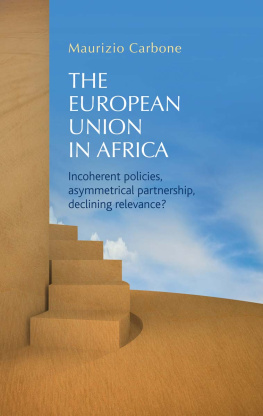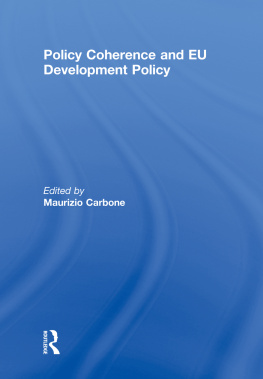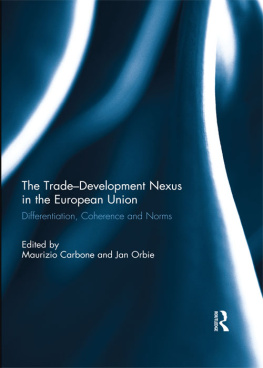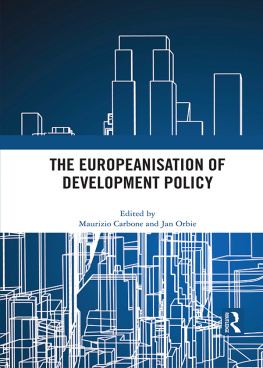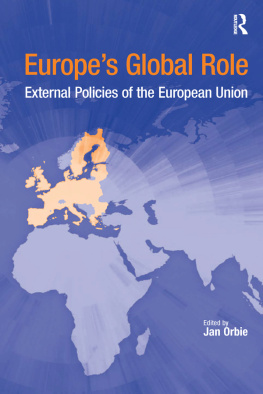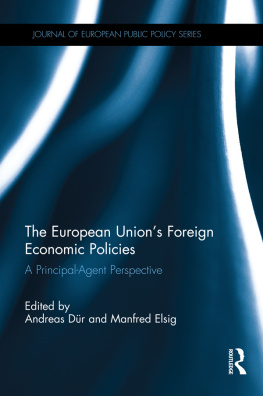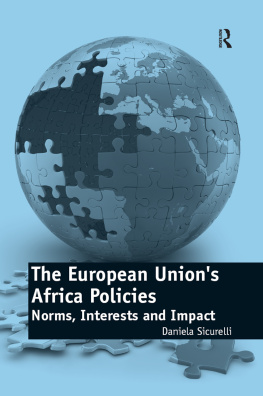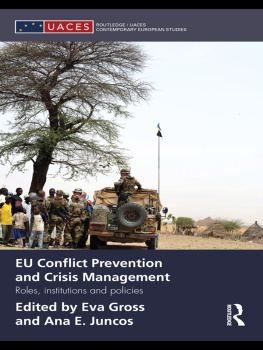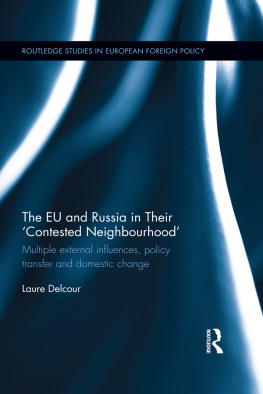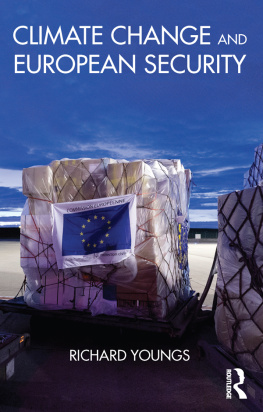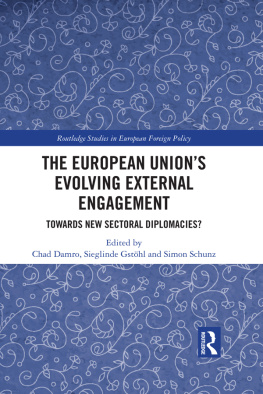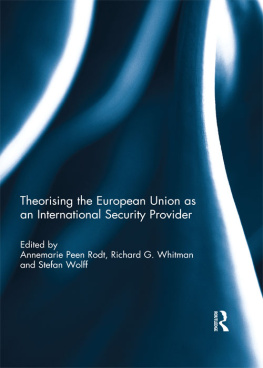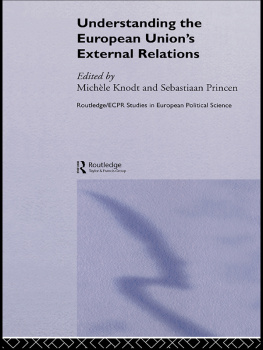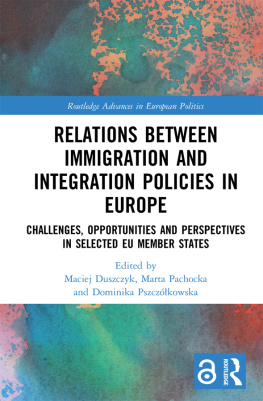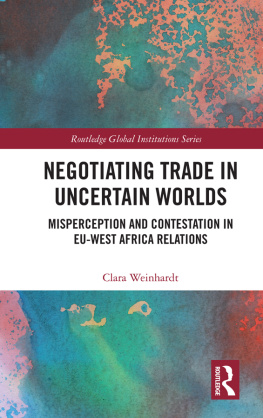The European Union in Africa
The European Union in Africa
Incoherent policies, asymmetrical partnership, declining relevance?
Edited by Maurizio Carbone
Manchester University Press
Manchester and New York
distributed in the United States exclusively
by PALGRAVE MACMILLAN
Copyright Manchester University Press 2013
While copyright in the volume as a whole is vested in Manchester University Press, copyright in individual chapters belongs to their respective authors, and no chapter may be reproduced wholly or in part without the express permission in writing of both author and publisher.
Published by Manchester University Press
Oxford Road, Manchester M13 9NR, UK
and Room 400, 175 Fifth Avenue, New York, NY 10010, USA
www.manchesteruniversitypress.co.uk
Distributed in the United States exclusively by
Palgrave Macmillan, 175 Fifth Avenue, New York,
NY 10010, USA
Distributed in Canada exclusively by
UBC Press, University of British Columbia, 2029 West Mall,
Vancouver, BC, Canada V6T 1Z2
British Library Cataloguing-in-Publication Data
A catalogue record for this book is available from the British Library
Library of Congress Cataloging-in-Publication Data applied for
ISBN 978 07190 8346 4
First published 2013
The publisher has no responsibility for the persistence or accuracy of URLs for any external or third-party internet websites referred to in this book, and does not guarantee that any content on such websites is, or will remain, accurate or appropriate.
Typeset by Servis Filmsetting Ltd, Stockport, Cheshire
Contents
List of tables
Government and civil society expenditure in ACP countries
Governance allocations from 10th EDF (200813) to sub-Saharan Africa
Government and civil society expenditure in ENPI South countries
Overview of African interim EPA initialling states
The JAES, development and energy security
Notes on the contributors
Maurizio Carbone is Professor of International Relations and Development and Jean Monnet Chair of EU External Policies at the University of Glasgow.
Gordon Crawford is Professor of Development Politics and Director of the Centre for Global Development at the University of Leeds.
Mary Farrell is Reader in European and International Politics and Jean Monnet Chair at the University of Greenwich.
Toni Haastrup is Teaching Fellow in International Security in the Politics and International Studies, University of Warwick.
Amelia Hadfield is Professor in European Affairs and Senior Research Fellow at the Institute of European Studies, Vrije Universiteit Brussel.
Simon Lightfoot is Senior Lecturer in European Politics at the University of Leeds.
Alan Matthews is Professor Emeritus of European Agricultural Policy, Department of Economics, Trinity College, Dublin.
Gorm Rye Olsen is Professor in Global Politics and Head of the Institute of Society and Globalisation at Roskilde University.
Jan Orbie is Professor of European Union Politics at the Centre for EU Studies at Ghent University.
Michael Smith is Professor of European Politics and Jean Monnet Chair at Loughborough University.
Fredrik Sderbaum is Associate Professor at the School of Global Studies, University of Gothenburg, and Associate Senior Research Fellow at the United Nations University-Comparative Regional Integration Studies (UNU-CRIS), Bruges.
Christopher Stevens is a Senior Research Associate at the Overseas Development Institute (ODI), London.
Ian Taylor is Professor in International Relations and African Politics at the University of St Andrews.
Tine Van Criekinge is Fellow in International Relations at the London School of Economics.
Richard Whitman is Professor of Politics and International Relations at the University of Kent.
Preface
This book originates from a workshop which was held at the University of Glasgow in December 2009. In that context, I was encouraged to draft a proposal for a book, whose original title was One Europe, One Africa. The idea back then was to concentrate on the 2007 Joint AfricaEU Strategy and its attendant AfricaEU partnerships. Increasingly, it became evident that this type of approach would be too narrow to fully capture the tensions and contradictions in the relationship between the two partners. For this, I asked a few more contributors to join the project. The completion of the book, thus, took longer than anticipated. The aim was not to focus only on the more established areas of the EUAfrica cooperation aid, trade, security but to discuss new areas of cooperation, such as migration, climate change, energy and social policies. Moreover, the ambition was not to treat Africa as a passive actor, an empty space where the EU could just test its international ambitions. Thus, this volume looks at the evolving relationship between the EU and Africa from both the EUs and Africas perspectives. It should be noted however that, except very brief analyses in some chapters, this volume does not take into account the EUs (lack of a) role in North Africa in the 2011 Arab Spring.
My gratitude goes to a number of people who have contributed to the successful completion of this volume. First, I am indebted to the contributors, who have respected deadlines and reacted to comments in a very constructive way. Second, I would like to thank the team at Manchester University Press. They have all supported and encouraged me at various stages, from the initial proposal, throughout the peer review processes, to the final editing stage. Third, I am grateful to my colleagues and friends in Glasgow, who make my life at the university easier and enjoyable. Lastly, my thoughts are always with my family in Italy. I have now been away for more than 15 years, but my roots are still in my small village, Ceramida.
This book is dedicated to the people of Africa. Over the past decade I have travelled to Botswana, Djibouti, Egypt, Ethiopia, Gambia, Kenya, Malawi, Senegal, South Africa and Uganda, spending between one week and two months in each country. In these trips I met politicians, civil servants and members of civil society for research purposes and ordinary citizens for my personal growth. Every time I came back to Europe I felt enriched and couldnt wait to start a new trip. Only those who have been in Africa understand what the mal dAfrique entails. I have been lucky enough to suffer from this many, many times.
Ceramida and Glasgow, 30 July 2012
Authors note
The term European Union is generally used to refer to the sui generis entity that was created with the Treaty of Maastricht in 1993, whereas for the period between 1957 and 1992 the term European Community is often preferred. In this book, we have used the term European Union for both periods.
Please note that references to the various EU treaties (including Rome, Maastricht, and Lisbon) can be found at this webpage: http://europa.eu/about-eu/basic-information/decision-making/treaties/index_en.htm(accessed 10 July 2012). References to the various Lom Conventions can be found at this webpage: http://aei.pitt.edu/ (accessed 10 July 2012).
Part I

